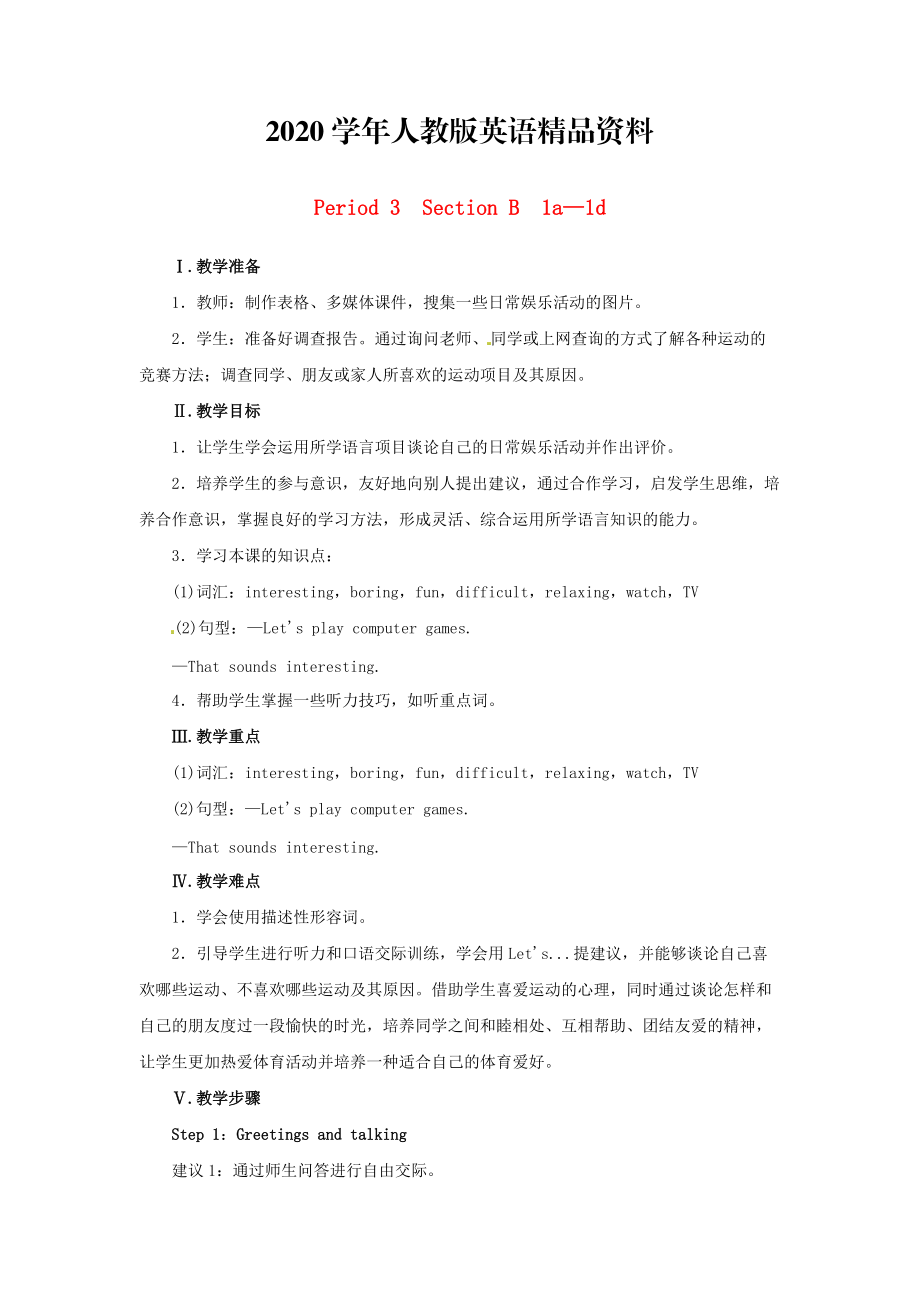《2020【人教版】七年級英語上冊:Unit 5 Period 3Section B 1a1d教案》由會員分享����,可在線閱讀,更多相關《2020【人教版】七年級英語上冊:Unit 5 Period 3Section B 1a1d教案(8頁珍藏版)》請在裝配圖網(wǎng)上搜索����。
1�、2020學年人教版英語精品資料
Period 3 Section B 1a—1d
Ⅰ.教學準備
1.教師:制作表格���、多媒體課件��,搜集一些日常娛樂活動的圖片�����。
2.學生:準備好調(diào)查報告����。通過詢問老師����、同學或上網(wǎng)查詢的方式了解各種運動的競賽方法;調(diào)查同學���、朋友或家人所喜歡的運動項目及其原因���。
Ⅱ.教學目標
1.讓學生學會運用所學語言項目談論自己的日常娛樂活動并作出評價�。
2.培養(yǎng)學生的參與意識���,友好地向別人提出建議,通過合作學習��,啟發(fā)學生思維����,培養(yǎng)合作意識,掌握良好的學習方法����,形成靈活、綜合運用所學語言知識的能力�����。
3.學習本課的知識點:
(1)詞匯:interesting����,
2、boring����,fun,difficult����,relaxing���,watch,TV
(2)句型:—Lets play computer games.
—That sounds interesting.
4.幫助學生掌握一些聽力技巧�,如聽重點詞。
Ⅲ.教學重點
(1)詞匯:interesting����,boring,fun����,difficult,relaxing��,watch����,TV
(2)句型:—Lets play computer games.
—That sounds interesting.
Ⅳ.教學難點
1.學會使用描述性形容詞。
2.引導學生進行聽力和口語交際訓練����,學會用Lets.
3、..提建議��,并能夠談論自己喜歡哪些運動�����、不喜歡哪些運動及其原因���。借助學生喜愛運動的心理���,同時通過談論怎樣和自己的朋友度過一段愉快的時光,培養(yǎng)同學之間和睦相處��、互相幫助����、團結友愛的精神,讓學生更加熱愛體育活動并培養(yǎng)一種適合自己的體育愛好����。
Ⅴ.教學步驟
Step 1:Greetings and talking
建議1:通過師生問答進行自由交際。
教師問多個學生問題���,讓學生回答�����,目的是為了訓練學生開口說英語的能力����,提高學生學習英語的興趣。教師在與學生進行自由交際時要結合本單元已經(jīng)學過的語言項目�,要圍繞這個課時的句型“—Lets play computer games.—That sound
4、s interesting.”展開���。
建議2:通過學生相互問答進行自由交流��。讓學生之間相互提問題�����,訓練學生的口語交際能力��。
For example:
S1:Do you have a baseball?
S2:Yes���,I do.
S1:Let play baseball.
S2:That sounds good.
S1:Does she have a pingpong bat?
S2:Yes,she does.
S1:Lets play pingpong ball.
S2:That sounds good.
建議3:通過chant來復習have�����,has的肯定句、一般疑問句
5��、��、否定句的用法����。chant的形式可以營造氛圍���,調(diào)節(jié)情趣�����,激發(fā)興趣���,鍛煉和加強學生的記憶,幫助他們掌握知識���;更能培養(yǎng)學生良好的語音��、語調(diào)���,增強其語感。
I have,you have����,they have.
She has,he has�����,Mary has.
Do I�,do you,do they?
Does she��,does he�,does Mary?
I dont,you dont�,they dont.
She doesnt,he doesnt���,Mary doesnt.
Step 2:Check the homework
建議1:檢查上節(jié)課的家庭作業(yè)�����。
找?guī)孜粚W生站起來�,向全體
6�����、學生朗讀自己所編的對話,目的是了解學生對上節(jié)課所學語言項目的掌握情況���。
A:Do you have a baseball?
B:Yes����,I do.
A:Great����!I have a bat.Lets play!
A:Does John have a soccer ball?
B:No���,he doesnt.
A:Does he have a pingpong bat?
B:Yes����,he does.I think he has a pingpong ball���,too.
A:Hmm...lets ask.
建議2:讓學生小組內(nèi)交換家庭作業(yè)�,檢查有無語言錯誤���,然后再朗讀����、分角色對話,
7����、目的是檢查家庭作業(yè),并培養(yǎng)學生的動口能力�,激發(fā)學生學習英語的興趣。
Step 3:Practice the new words
建議1:通過處理課文的1a部分來練習新單詞��。教師可以讓學生在課本上直接完成��,然后把單詞寫在黑板上�����,把interesting����,relaxing,boring 這三個單詞寫在一組����,便于學生抓住其共同點。教師領讀����,讓學生齊讀�����,再找個別同學讀����,確保學生把這些詞匯讀正確����。
interesting difficult
relaxing fun
boring
建議2:教師給學生出示一組形容詞和一組圖片,讓學生猜哪個圖片表達的是哪個形容詞的含義��??梢园褜W生分成4~6組
8���、����,進行搶答���,答對得一分�,比一比哪組得分最高。
建議:3:學生可與同伴互相畫圖表現(xiàn)某個形容詞的含義��,讓同伴猜出這個單詞��,或者一個學生畫圖�,向全班展示,讓全體同學猜����,以完全理解該詞。這樣既可以提高學生的學習興趣����,又可以練習新單詞。
建議4:可以讓學生自由發(fā)揮�����,使用所學新單詞造句����。既可以練習五個形容詞的用法,又可以復習前面所學的單詞�。
For example:
She has an interesting book.
The question is difficult.
The TV show is boring.
The computer game is fun.
Step 4
9、:Present the new sentences
建議1:利用多媒體圖片進行操練:教師呈現(xiàn)一張圖片�����,然后讓學生根據(jù)圖片所提供的語言信息進行簡單的對話練習,目的是訓練本課時所學的語言項目����。
教師先向?qū)W生出示圖片,讓學生從整體上了解圖片所提供的信息�,朗讀短語。教師可以先與班里的同學做個示范�,然后讓學生根據(jù)示范進行問答練習。
For example:
T:Lets play volleyball.
S1:That sounds interesting.
T:Lets play baseball.
S2:That sounds difficult.
T:Lets play so
10��、ccer ball.
S3:That sounds good.
T:Lets play tennis.
S4:That sounds fun.
T:Lets watch TV.
S5:That sounds boring.
建議2:創(chuàng)設情景進行操練:假如在假期中你和朋友在一起��,你們討論下午的活動安排��。創(chuàng)設真實情景使學生將所學語言結構應用到實際生活中���,培養(yǎng)他們用英語交際的能力。
A:Lets play computer games!
B:That sounds interesting����,but I dont have a computer.
A:Well,do you have
11�、a volleyball?
B:Yes.
A:Then lets play volleyball.
B:That sounds fun.
Step 5:Listening
1.創(chuàng)設情景���,利用問題導入聽力內(nèi)容:保羅和他的朋友在討論課外活動安排,讓學生聽錄音��,在1a中勾出所聽到的形容詞�。
2.讓學生再聽一遍錄音,然后把保羅評論下列活動的形容詞填在橫線上���。
play computer games ____________
play volleyball ____________
watch TV ____________
play basketball ____________
12��、
3.你扮演保羅����,你的同伴扮演保羅的朋友珍妮��,談論1c中的活動����。
Paul:Lets play computer games.
Jenny:That sounds interesting,but I dont have a computer.
Paul:Well����,do you have a volleyball?
Jenny:Yes.
Paul:Then lets play volleyball.
Jenny:Oh,volleyball is so difficult...
Paul:OK�,lets watch TV.
Jenny:That sounds boring.Hmm
13�、m...Lets play soccer���!Do you have a soccer ball?
Paul:No��,I dont.
Jenny:Oh.Well���,do you have a basketball?
Paul:Yes,I do.Lets play basketball!
Jenny:That sounds fun!
Step 6:Task
假設周五下午要進行活動��。教師讓學生以小組為單位決定自己的活動方式�����。運用所學句型征求其他成員的意見����。
Activities
S1
S2
S3
S4
S5
Decision
play tennis
p
14、lay soccer ball
play basketball
play baseball
play volleyball
play computer games
watch TV
Step 7:Summary
1.本課時學習了 interesting�,difficult,relaxing����,fun����,boring等形容詞及一些動詞短語�,重點學習和操練了新語言項目“—Lets play computer games.—That sounds
15��、interesting.”�。
2.掌握了一些聽力技巧。
Step 8:Homework
根據(jù)下面所提供的信息編一個英語對話���。
play pingpong ball
boring
play baseball
difficult
play computer games
interesting
play soccer ball
relaxing
Unit 5 Do you have a soccer ball���?
Section B 1a1d
Words
Sentences
interesting
boring
fun
difficult
relaxin
16、g
watch
TV
—Lets play computer games.
—That sounds interesting.
知識講解
1.interesting 形容詞���,意為“有趣的”�����?��?梢宰鞅碚Z,其主語通常是事或物�����,指某事或某物本身有趣;也可以作定語�����,既可以修飾人�����,也可以修飾物����。
The book is very interesting.這本書很有趣。
That sounds interesting.那樣聽起來很有趣��。
I have an interesting book.我有一本有趣的書�����。
He is an interesting man.他是一個有意思的人����。
17、
interested 形容詞����,意為“感興趣的”���。多用于“be/become interested in...”這一結構中�����。interested 作表語���,指某人對某事物感興趣����,其主語是人����,而不是物。
Are you interested in soccer ball�����?你對足球感興趣嗎����?
He is interested in the computer.他對電腦感興趣。
interest 名詞,意為“興趣�����,愛好”��。
He shows an interest in music.他對音樂感興趣����。
He takes an interest in politics.他對政治感興趣。
int
18�、erest 動詞,意為“使感興趣����,引起興趣,使著迷”����。
The book may interest you.那本書會讓你感興趣的。
He interested me in football.他使我對足球產(chǎn)生興趣����。
2.relaxing 形容詞,意為“放松的”�����。
Comedies are relaxing.喜劇令人放松。
relaxed 形容詞�����,意為“使人放松的”�。
Listening to the music makes me relaxed.聽音樂讓我放松��。
relax 動詞�,意為“使松弛,使放松����,使休息”。第三人稱單數(shù)形式為relaxes��。
We must not rela
19�����、x in our efforts.我們要繼續(xù)努力�,不能放松。
He relaxes an hour every day.他每天放松一個小時���。
3.fun 名詞�,意為“玩笑,嬉戲”�����。have fun 玩樂 for fun 開玩笑的
形容詞意為“有趣的�,供娛樂的”。
She is a fun person to be with.與她相處很有趣��。
have fun doing sth.表示“做某事開心”�。
I have fun playing in the water.我在水里玩得非常開心。
funny 形容詞����,意為“好玩的,好笑的�,滑稽的”。
The story is very
20����、funny.這個故事很可笑。
4.difficult形容詞��,意為“困難的”�。反義詞為easy����。
It is difficult for me to answer the question.
對于我來說這個問題難以回答���。
difficulty 名詞��,意為“困難�����,艱難”。
I find some difficulty in learning English.我覺得學習英語有些困難�����。
5.watch名詞�����,意為“手表”��。復數(shù)形式為watches���。
She has two watches.她有兩塊手表�����。
動詞�����,意為“觀看�����,注視”�。
He watches TV every day.他每天看電視。
 2020【人教版】七年級英語上冊:Unit 5 Period 3Section B 1a1d教案
2020【人教版】七年級英語上冊:Unit 5 Period 3Section B 1a1d教案

